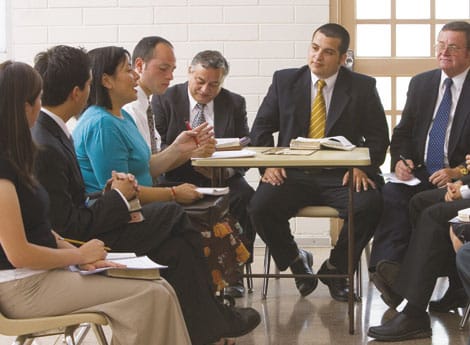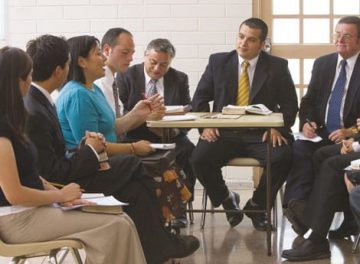How to be Sensitive to Young Women when Teaching about the Priesthood
In 2013, the entire month of June was devoted to lessons about the priesthood. The introduction to this priesthood section of the 2013 Young Women curriculum contained this note:
Be sensitive to young women who live without priesthood authority in the home or have negative examples in their lives.
By all means, do be sensitive to such situations, but I wonder why it did not occur to the authors to remind teachers to be sensitive to the fact that all of the students in the class are young women and therefore excluded from the priesthood? Sensitivity to this issue is paramount as we prepare to discuss the priesthood in Young Women’s class every week for a whole month. Some of the young women in your class may feel concerned, frustrated or hurt as they watch their male peers administer sacred ordinances of the priesthood every week and receive higher offices of the priesthood every other year. Spending a month discussing ordinances they are not allowed to perform and offices they are not allowed to hold could exacerbate these feelings.
How can you be sensitive to young women who struggle with their exclusion from the priesthood?
- Foster an open forum for discussion. Don’t chastise young women for expressing concerns.
- Express empathy. Validate their concerns. Simple statements like, “Yes, that is hard,” go a long way.
- Do not use folk doctrine to explain gender disparities. Explanations like, “Women have motherhood instead of priesthood,” or “Women access the priesthood through their husbands,” are even more unsatisfying when directed toward young women, who do not have children or husbands. Another common folk doctrine is that women don’t need the priesthood because they are more spiritual than men; this idea stereotypes men as spiritually weak.
- Avoid statements like, “I’m glad women don’t have the priesthood. I wouldn’t want the responsibility.” First of all, eschewing responsibility is antithetical to the Young Women values and theme. Secondly, the priesthood is a sacred gift, not a burden. Finally, it is untrue that women of the church lack responsibility. Many callings held by women in the church are as time-consuming as male callings. More importantly, women are as responsible as men before God.
- If young women ask your opinion, you may share it briefly but do not attempt to sway theirs. Clarify that you are expressing an opinion, not doctrine. Encourage young women to seek their own answers by “study and also by faith” (D&C 109:7).
Many are called, but few are chosen
Read Doctrine and Covenants 121:34-40
34 Behold, there are many acalled, but few are chosen. And why are they not chosen?
35 Because their ahearts are set so much upon the things of this bworld, and caspire to the dhonors of men, that they do not learn this one lesson—
36 That the arights of the priesthood are inseparably connected with the powers of heaven, and that the powers of heaven cannot be bcontrolled nor handled only upon the cprinciples of righteousness.
37 That they may be conferred upon us, it is true; but when we undertake to acover our bsins, or to gratify our cpride, our vain ambition, or to exercise control or ddominion or compulsion upon the souls of the children of men, in any degree of unrighteousness, behold, the heavens ewithdraw themselves; the Spirit of the Lord is grieved; and when it is withdrawn, Amen to the priesthood or the authority of that man.
38 Behold, ere he is aware, he is left unto himself, to akick against the pricks, to bpersecute the saints, and to cfight against God.
39 We have learned by sad experience that it is the anature and disposition of almost all men, as soon as they get a little bauthority, as they suppose, they will immediately begin to exercise cunrighteous dominion.
40 Hence many are called, but afew are chosen.
What do these verses teach us about how to increase our spiritual power? What is unrighteous dominion?
Read Doctrine and Covenants 121:41-46.
41 No apower or influence can or ought to be maintained by virtue of the bpriesthood, only by cpersuasion, by dlong-suffering, by gentleness and meekness, and by love unfeigned;
42 By akindness, and pure bknowledge, which shall greatly enlarge the csoul without dhypocrisy, and without eguile—
43 aReproving betimes with bsharpness, when cmoved upon by the Holy Ghost; and then showing forth afterwards an increase of dlove toward him whom thou hast reproved, lest he esteem thee to be his enemy;
44 That he may know that thy faithfulness is stronger than the cords of adeath.
45 Let thy abowels also be full of charity towards all men, and to the household of faith, and let bvirtue garnish thy thoughts unceasingly; then shall thy cconfidence wax strong in the dpresence of God; and the doctrine of the priesthood shall distil upon thy soul as the edews from heaven.
46 The Holy Ghost shall be thy constant acompanion, and thy scepter an unchanging scepter of brighteousness and truth; and thy cdominion shall be an everlasting dominion, and without compulsory means it shall flow unto thee forever and ever.
Can you think of stories from the Savior’s life that exemplify these attributes?
Priesthood Authority in the Family and the Church
Ask class members to silently read this excerpt from Priesthood Authority in the Family and the Church, by Dallin H. Oaks, and consider these questions, “What are the Lord’s principles for use of priesthood authority? When should a man not be honored in his priesthood?” Afterwards, discuss conclusions with the rest of the class.
The family proclamation gives this beautiful explanation of the relationship between a husband and a wife: While they have separate responsibilities, “in these sacred responsibilities, fathers and mothers are obligated to help one another as equal partners” (“The Family: A Proclamation to the World,” Liahona, Oct. 2004, 49; Ensign, Nov. 1995, 102; emphasis added).
President Spencer W. Kimball said this: “When we speak of marriage as a partnership, let us speak of marriage as a full partnership. We do not want our LDS women to be silent partners or limited partners in that eternal assignment! Please be a contributing and full partner” (The Teachings of Spencer W. Kimball, ed. Edward L. Kimball [1982], 315).
President Kimball also declared, “We have heard of men who have said to their wives, ‘I hold the priesthood and you’ve got to do what I say.’” He decisively rejected that abuse of priesthood authority in a marriage, declaring that such a man “should not be honored in his priesthood” (The Teachings of Spencer W. Kimball, 316).
There are cultures or traditions in some parts of the world that allow men to oppress women, but those abuses must not be carried into the families of the Church of Jesus Christ. Remember how Jesus taught: “Ye have heard that it was said by them of old time, … but I say unto you …” (Matt. 5:27–28). For example, the Savior contradicted the prevailing culture in His considerate treatment of women. Our guide must be the gospel culture He taught.
If men desire the Lord’s blessings in their family leadership, they must exercise their priesthood authority according to the Lord’s principles for its use:
“No power or influence can or ought to be maintained by virtue of the priesthood, only by persuasion, by long-suffering, by gentleness and meekness, and by love unfeigned; By kindness, and pure knowledge” (D&C 121:41–42).
When priesthood authority is exercised in that way in the patriarchal family, we achieve the “full partnership” President Kimball taught. As declared in the family proclamation:
“Happiness in family life is most likely to be achieved when founded upon the teachings of the Lord Jesus Christ. Successful marriages and families are established and maintained on principles of faith, prayer, repentance, forgiveness, respect, love, [and] compassion” (Liahona, Oct. 2004, 49; Ensign, Nov. 1995, 102).
Church callings are performed according to the principles that govern all of us in working under priesthood authority in the Church. These principles include the persuasion and gentleness taught in the 121st section, which are especially necessary in the hierarchal organization of the Church.
Sustaining the Priesthood and Priesthood Holders
While we sometimes refer to priesthood holders as ‘the priesthood,’ we must never forget that the priesthood is not owned by or embodied in those who hold it. It is held in a sacred trust to be used for the benefit of men, women, and children alike. 2 -Dallin H. Oaks
The priesthood is “without father, without mother, … having neither beginning of days, nor end of life” (Heb. 7:30), nor maleness nor femaleness. It is head to them both. Male and female alike come under it and must understand their true relationship to it, one to serve as priest within it, the other eventually as a priestess. Men here are given the priesthood power, but both man and woman must bring themselves into submission unto it, rather than she unto him as a person. The man must assume the same relationship of honor and obedience to priesthood truths and doctrines that the woman does. That is, it precedes them both. For the man to assume that because he “holds” the priesthood that it is his or that he is somehow exalted in importance is a serious distortion. – Gib Kocherhans Reference A
How is the priesthood different from priesthood holders? Why would it be important to differentiate between the priesthood and priesthood holders?
Single Sisters and the Priesthood
Ask class members to silently read Daughters in my Kingdom, Chapter 8, under the subheader “Single Sisters and the Priesthood” and consider the question, “How can we have the priesthood in our lives if we do not have a priesthood holder in our lives?” Afterwards, discuss conclusions with the rest of the class.
Single Sisters and the Priesthood
Many Latter-day Saints have never been married. Others are single because of the death of a spouse, abandonment, or divorce. Like all members of the Church, these members will be blessed as they remain faithful to their covenants and do all they can to strive for the ideal of living in an eternal family. They can enjoy the blessings, strength, and influence of the priesthood in their lives and homes through the ordinances they have received and the covenants they keep.
Elder Dallin H. Oaks told of the faithfulness of his mother, who was widowed at a young age. Having been sealed to her husband in the temple, she did not consider herself single; nevertheless, she had to rear her three children alone. Elder Oaks recalled:
“My father died when I was seven. I was the oldest of three small children our widowed mother struggled to raise. When I was ordained a deacon, she said how pleased she was to have a priesthood holder in the home. But Mother continued to direct the family, including calling on which one of us would pray when we knelt together each morning. …
“When my father died, my mother presided over our family. She had no priesthood office, but as the surviving parent in her marriage she had become the governing officer in her family. At the same time, she was always totally respectful of the priesthood authority of our bishop and other Church leaders. She presided over her family, but they presided over the Church. …
“The faithful widowed mother who raised us had no confusion about the eternal nature of the family. She always honored the position of our deceased father. She made him a presence in our home. She spoke of the eternal duration of their temple marriage. She often reminded us of what our father would like us to do so we could realize the Savior’s promise that we could be a family forever.”27
Another man told of his mother presiding in the home: “Just as I was preparing to serve a full-time mission, my father left our family and the Church. Under these circumstances, it was difficult for me to leave home for two years, but I went. And while I served the Lord in a faraway land, I learned of my mother’s strength at home. She needed and appreciated the special attention she received from men who held the priesthood—her father and brothers, her home teachers, other men in the ward. However, her greatest strength came from the Lord Himself. She did not have to wait for a visit in order to have the blessings of the priesthood in her home, and when visitors left, those blessings did not leave with them. Because she was faithful to the covenants she had made in the waters of baptism and in the temple, she always had the blessings of the priesthood in her life. The Lord gave her inspiration and strength beyond her own capacity, and she raised children who now keep the same covenants that have sustained her.”28
These women understood that they received added strength and help through the covenants they had made and kept.
This lesson is adapted from a lesson originally written for Young women in 2013 and titled, “How do I honor and uphold the priesthood?” Originally, it also contained an example of sustaining church leaders from Exodus, which is now available here: https://exponentii.org/blog/come-follow-me-exodus-14-17-stand-still-and-see-the-salvation-of-the-lord-and-exodus-18-20-all-that-the-lord-hath-spoken-we-will-do/ and an attached bonus lesson, Should I serve a mission? which is now available here: https://exponentii.org/blog/come-follow-me-doctrine-and-covenants-3-5-my-work-shall-go-forth/






11 Responses
Great lesson! Love the suggestions at the beginning! The simple act of not blithely dismissing sincere questions can make all the difference.
What a difference it would have make for me as a young woman.
Many thanks for the time you put into this!
Thank you for this, I love it! I love the bonus lesson too. I don’t get why we don’t have anything preparing girls to serve missions. I understand that it is not a duty. I have a laurels class of seven girls and three of them have openly expressed a desire to serve missions while others are unsure. So about half of my girls are planning to go in a year or so, yet we have no curriculum or activities designed to help them in this. Even the girls who don’t currently think they would go would benefit from lessons on missionary work and preparing themselves to enter the temple. I was planning to steal this lesson from the Aaronic Priesthood manual anyway.
What a great lesson (I particularly love the bonus part).
You mentioned Elder Oaks talking about his mother. Course Correction wrote a great post with more details about her life here: https://exponentii.org/role-models/ which might be worth sharing in class.
[…] about the roles only their male counterparts play and makes it a little easier to follow the sensitivity recommendations in this Young Women lesson about priesthood and in this Young Women Lesson about priesthood. (Still, I recommend that Young Women leaders […]
[…] be apathetic at best or hurt and angry. April posted some excellent ways to foster discussion in her YW’s lesson earlier this month. I would also add that in these lessons it is important to get women’s teachings in here as […]
I never comment on websites, but I just feel the need to respond to one of your comments in the introduction. Although I appreciate your sincere efforts and ideas, I am troubled by some of your words. You stated, “…remind teachers to be sensitive to the fact that all of the students in the class are young women and therefore excluded from the priesthood.”
Women are not excluded from the priesthood. On the contrary, the blessings of the priesthood are available to every man, woman, and child on this earth. I don’t feel that a belief that women are excluded from the priesthood is accurate, and this belief conveys a lack of knowledge regarding the priesthood that should be addressed by the teacher within herself before she tries to teach the Lord’s precious daughters, lest she convey this false notion in her message.
Please prayerfully read the talk “Power in the Priesthood” by Neil L. Andersen. My favorite passage is, “A man may open the drapes so the warm sunlight comes into the room, but the man does not own the sun or the light or the warmth it brings. The blessings of the priesthood are infinitely greater than the one who is asked to administer the gift.” Women are not excluded from the priesthood any more than they are excluded from the warmth or light of the sun.
I’m saddened that any sister would feel excluded from any of the Lord’s gifts to his children, and the priesthood is certainly one of his greatest gifts. The Lord will certainly hold accountable any priesthood holder who made you or any of his children feel excluded from the blessings of his priesthood. Sorry for the length, but I just feel such sorrow for any woman who feels as you stated.
I would stand by the statement- women are excluded from the priesthood. I didn’t say they were excluded from many of the priesthood’s blessings, though by nature of not being a part of the priesthood, are excluded from some blessings. For example, the man opening the drapes, probably feels a sense of accomplishment for what he can do for his family and for the people around him as an instrument of God. That in itself is a blessing that women do not get to have, even though they can have ordinances administered to them.
[…] fabulous reads on past Exponent Priesthood lesson plans are here, here, here and […]